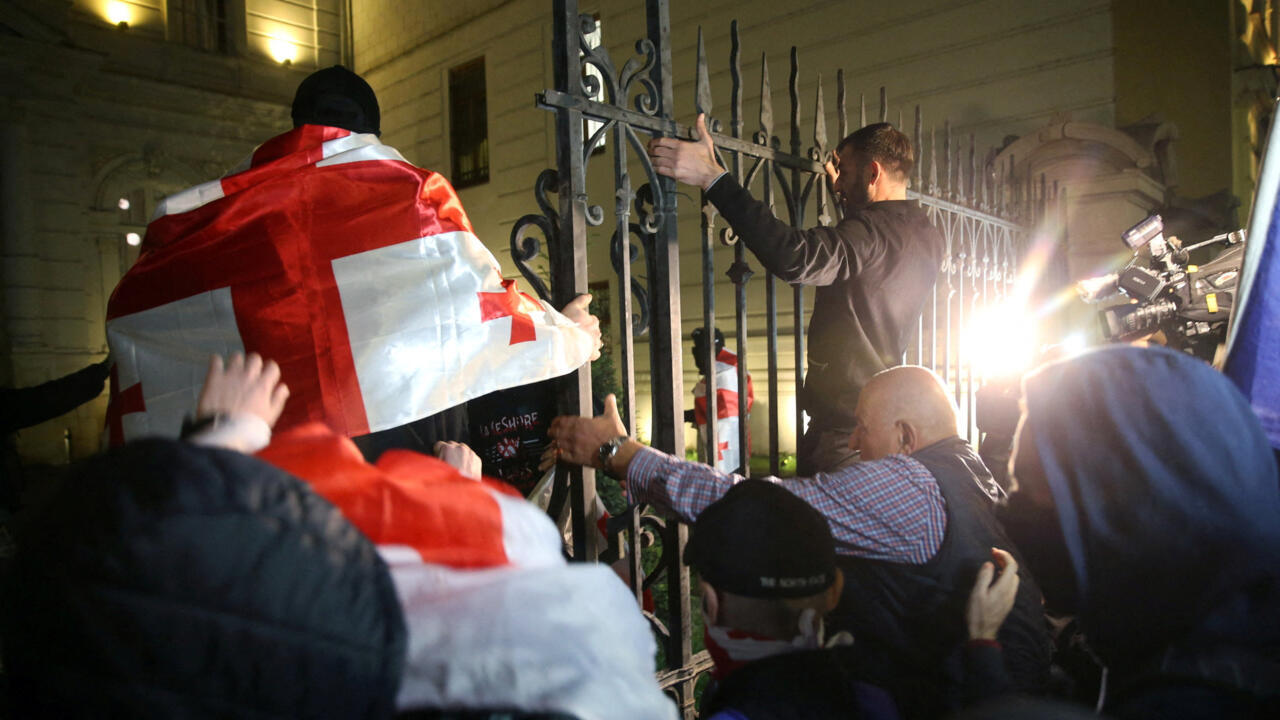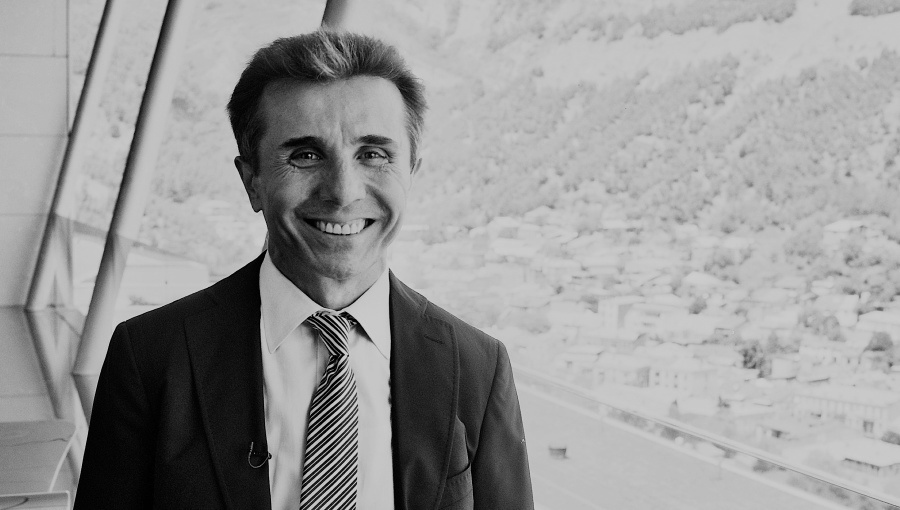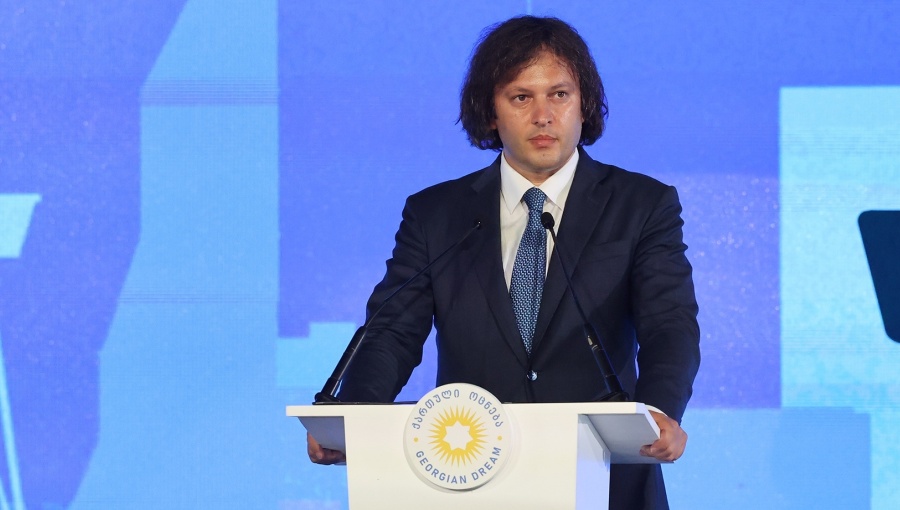Georgia, once celebrated as a post-Soviet democratic success story, has quietly slipped into authoritarianism under the stewardship of its elusive billionaire puppet master, Bidzina Ivanishvili.
In their recent report published by the Central Asia-Caucasus Institute, Bidzina Ivanishvili: Governing from the Shadows, scholars Gabriel Chubinidze and Stephen F. Jones argue that Ivanishvili has engineered a regime in Georgia that now bears more resemblance to President Alexander Lukashenko’s Belarus than Prime Minister Viktor Orbán’s Hungary.
The ruling Georgian Dream (GD) party, which Ivanishvili founded in 2011 and led to power in 2012, has undergone a transformation from democratic coalition at its formation, to vehicle for personal rule, the authors state.
The current situation in the Caucasus country can be likened to what Chubinidze and Jones call a “quasi-dictatorship”, where formal institutions are little more than façades and civil society is under siege.
At the heart of this transformation is Ivanishvili himself, a man who, the report states, “has created an illiberal and anti-European system which leaves no political space for either party opponents or civil society activists.”
Though he resigned as prime minister of Georgia in 2013, Ivanishvili never relinquished control. Instead, he opted for shadow rule — “a dark box, a camera obscura”, as Chubinidze and Jones put it — governing invisibly and with no official position, yet with total authority.
New levels of authoritarianism
Though Georgia has long suffered from democratic weaknesses and strongman politics, Chubinidze and Jones argue Ivanishvili has taken authoritarianism to new levels.
The country’s three post-Soviet leaders — Eduard Shevardnadze, Mikheil Saakashvili and Ivanishvili himself when he entered politics in 2011 — each began their rule by promising democratic, pro-European reform.
Yet, as Chubinidze and Jones point out, “none of these leaders left democracy any stronger than when they arrived.”
While Shevardnadze brought post-independence stability and Saakashvili launched bold anti-corruption reforms, both men ultimately centralised power.
Ivanishvili, the authors argue, has gone further, hollowing out formal institutions and replacing them with an opaque, loyalty-based structure that functions without democratic oversight.
As the report notes, “there is no public accountability to the citizenry, nor to the goals of democracy or liberal pressures from abroad.”
It is not his authoritarianism, Chubinidze and Jones point out, that sets Ivanishvili apart from his predecessors, but his “ideological transformation from pro-Western reformer to anti-European strongman”, a pivot the authors say has brought Georgia to a new political juncture.
“Neither Shevardnadze nor Saakashvili imprisoned the entirety of the political opposition or condemned the European Union as harmful. Ivanishvili has done both. He has established an authoritarian system in his own image,” state Chubinidze and Jones.
The billionaire behind the veil
“Political personalities play an outsized role in Georgian politics,” write Chubinidze and Jones; “to understand the system, you need to know the personalities who run it, their psychology, where they came from, and who their associates are”.
Yet Ivanishvili’s power is not rooted in public presence or charisma. Chubinidze and Jones describe him as “a difficult case” who, unlike Shevardnadze or Saakashvili, “has little charisma and shuns interviews”. “His power comes from his wealth,” the report declares.
Born in 1956 in the small mining town Chorvila in western Georgia and educated in Moscow, Ivanishvili made his fortune amid the lawless capitalism of 1990s Russia, where he amassed a fortune through ventures like Rossiyskiy Kredit and shares in Gazprom and Rusal.
“Protectionism, patronage, extortion and murder were instruments of survival and the skills required for success,” Chubinidze and Jones note, drawing a connection between Ivanishvili’s formative experiences in the world of Russian business in the 90s and what came to be his style of governance.
A Soviet-formed, Russia-fortified worldview still shapes his politics, the authors argue. According to the report, “for the genus homo sovieticus, to which Ivanishvili belongs, political and economic power are indivisible.”
His fortune, Chubinidze and Jones note, is equivalent to 25% of Georgia’s GDP, and “his money underwrites his political power”.
Further, Ivanishvili’s “own moral concerns and financial needs are interwoven into Georgian state policy,” the report states.
A prolonged legal dispute with Credit Suisse in 2020, which resulted in hundreds of millions in frozen assets, hardened the billionaire’s deep distrust of Europe and, more broadly, the West, and spawned his allegations of “a Western conspiracy aimed at blackmailing him, undermining his political position and his financial interests”.
Former GD prime minister turned opposition leader Giorgi Gakharia argues it is these two interrelated concerns – money and power – that drive much of Ivanishvili’s anti-Western stance and prompt what analysts describe as his paranoid governing style.
This paranoia extends to his daily life: Ivanishvili is selective about his drinking water, fears poisoning and rarely appears in public. He is also eccentric, an owner of pet sharks, importer of fine art and collector of rare trees.
Behind closed doors, Ivanishvili sees NGOs and opposition figures not as rivals in a democratic contest but as existential threats to his own grip on power and position as puppeteer.
As Chubinidze and Jones put it, “he believes in conspiracy theories. He is paranoid about his security and is in a pathological pursuit of the [former-ruling United National Movement] UNM as an enemy of the state.”
This obsession with the UNM, the party of ex-president Saakashvili, has become a defining feature of GD’s system of rule.
The entire “collective National Movement” – as the ruling party refers to Georgia’s pro-Western opposition – is now framed as treasonous, with many high-profile leaders in jail, and state resources are mobilised to suppress dissent both on and off the streets.
Loyalists, not leaders
Chubinidze and Jones argue that, through “artfully planned philanthropy”, and rooted in his innate need for self-preservation, Ivanishvili has created a “stratum of officials, journalists, and lawyers privately indebted to him”.
Within the GD party, real leadership is non-existent. According to Chubinidze and Jones “Ivanishvili is the linchpin of the Georgian political system.”
Those who hold power around him serve not as political actors but as loyal executors — often former employees, bodyguards or personal acquaintances. One of his dentists and a former security detail have held senior political positions in the past.
Chubinidze and Jones employ the term “patrimonialism”, writing: “in the absence of established state institutions, a ruler controls government through personal loyalties, patron-client relations, business allegiances, and kinship.”
GD’s anti-European turn
Russia’s invasion of Ukraine in 2022 simultaneously gave Ivanishvili justification and cover for both a complete break with the West and authoritarian consolidation at home, the authors state.
GD’s two-strand offensive, employing both domestic and foreign policy, has successfully sabotaged Georgia’s prospective membership in the European Union, an aspiration polls consistently show is supported by the majority of the population.
Ivanishvili – who once insisted that a businessman cannot be successful “if he is not liberal and if he runs his business autocratically” – has, since his re-entry into public life as GD chair in 2018, become central to Georgia’s anti-Western, anti-democratic realignment.
A swathe of pro-European, progressive reforms, endorsed by Ivanishvili during his early years in power, have now been reversed, state Chubinidze and Jones.
In November 2024, GD suspended Georgia's EU accession negotiations, drawing hundreds of thousands of pro-European Georgians out onto the street in protest.
Georgia’s ideological transformation under Ivanishvili has taken the form of repressive legislation targeting civil society, consolidation of political power over state institutions, regression on social issues such as LGBT, erosion of democratic structures, smearing of Western leaders and government opponents at home and – crucially – an anti-Western narrative to match.
Since the full-scale war in Ukraine began, Ivanishvili has led the charge against what GD calls a subversive “deep state” network or “Global War Party”, which it alleges are plotting to open a second front of the Ukraine conflict in Georgia, an assertion the report dismisses as baseless fearmongering.
Further, Ivanishvili smeared the domestic opposition with the same brush, claiming the former ruling UNM was not a democratically elected government, but “an externally appointed revolutionary committee, a foreign agency” under the instruction of foreign “masters”.
In a rare, televised interview in October 2024, Ivanishvili declared: “You have to ban that which is the people's enemy and the country's enemy.”
It was upon this premise that GD moved to totally ban all opposition earlier this year, using the findings of its controversial commission as a basis of evidence upon which to “issue a strict political and legal condemnation to the collective UNM”, as Ivanishvili put it. The power – essentially – to outlaw all his opponents from politics.
“Ivanishvili has reached a new apogee of power and has the ability to end all opposition in Georgia, whether it is political parties, NGOs, the media, or external Western leverage,” declare Chubinidze and Jones.
“This resembles the Lukashenko school of authoritarianism,” the authors continue, “It surpasses Viktor Orbán’s authoritarian strategy, which controls the judiciary and monopolises the media, but permits an (admittedly severely constrained) opposition to exist.”
Chubinidze and Jones also note Ivanishvili’s rhetoric in relation to his party’s political opponents. “Using the language of homo sovieticus, Ivanishvili demonizes his rivals as enemies,” state the scholars.
By denouncing the domestic opposition and NGOs as “alien” to Georgian traditional values and “agents serving foreign forces”, Ivanishvili is able to engineer public consent around the measures GD is taking to eliminate them.
In line with its Eurosceptic rhetoric, GD has also introduced the hugely controversial “foreign agents” law targeting NGOs and independent media, branding them as “a pseudo-elite nurtured by a foreign country”.
Many in Georgia dub this bill the “Russian law”, likening it to similar legislation the Kremlin passed in 2013. Ivanishvili's critics accuse him of steering Georgia away from the liberal West and towards authoritarian Russia, using the GD party as the instrument to do so.
“Ivanishvili has consistently promoted normalisation of relations with Russia,” state Chubinidze and Jones, adding that “a significant portion” of the billionaire’s financial assets remain in Russia. Here again the authors draw attention to how Ivanishvili’s personal interests act as a key determiner of Georgia’s geopolitical fate.
Chubinidze and Jones highlight Moscow’s “powerful role” in Georgia’s social media, combined with the outsized influence of the Georgian Orthodox church, the emergence of populist allies in Europe, the EU's policy failures in Georgia and the election and re-election of US President Donald Trump as factors which, alongside Ivanishvili, explain the country’s “turn to political illiberalism”.
Georgia is heading into a local election on October 4 – a vote already mired in controversy amid a partial opposition boycott and mounting state repression.
Chubinidze and Jones warn that, amid GD’s “monopoly of political and economic power”, elections have lost all meaning.
The authors argue GD now operates not within a democratic framework but under a set of guiding principles dictated solely by Ivanishvili: “There is no law, only ‘the general line’—the only source of legitimacy is the will of the leader.”
The West reacts, tentatively
“Ivanishvili is unpopular with all manner of European and US leaders,” argue Chubinidze and Jones.
In response to Georgia’s democratic decline under GD, Brussels froze the country’s EU candidacy negotiations in late 2024.
The European Parliament passed multiple resolutions condemning democratic backsliding and the Georgian government’s “anti-European course”, with some MEPs calling for sanctions against Ivanishvili personally.
But the EU remains divided. Hungary and Slovakia have shielded Tbilisi from harsher measures, while other member states fear pushing Georgia closer to Russia.
The US, however, has taken a firmer stance. In December 2024, the Treasury Department imposed financial sanctions on Ivanishvili and several Georgian officials, accusing them of “undermining Georgia’s Euro-Atlantic trajectory”.
In May 2025, the House passed the MEGOBARI Act, which could mandate expanded sanctions pending a decision by the new US administration.
Despite these measures, Chubinidze and Jones warn the Ivanishvili regime is now doubling down — not retreating.
Inevitable collapse?
For all its control, the scholars suggest the system Ivanishvili has built may be inherently unstable.
“The Ivanishvili system has no social base, and in a crisis when it comes (and it will), the Ivanishvili system will quickly crumble,” they argue.
Georgia’s formal institutions — courts, parliament, electoral commissions — function only to serve the regime, offering the appearance of democracy without the substance. “Democracy needs citizens, accountable state structures, independent public servants, and honest elections. Ivanishvili has made sure Georgia has none of them,” Chubinidze and Jones state.
Ivanishvili’s grip on Georgia may appear unshakeable, but the authors believe that, “ultimately, the separation of Georgia from the West will not only damage the Georgian economy – the regime’s greatest weakness – but will alienate the regime from citizens who hold the deep conviction that Europe is their natural home.”
Further, the ruling elite stands increasingly isolated from the society it claims to represent, amid ongoing anti-government protests in Tbilisi.
While Chubinidze and Jones do not predict when or how the GD regime will collapse, they are clear about the stakes. “Creeping authoritarianism, not democratic backsliding, is a better description of Georgia’s political tradition over the last three decades,” the report declares.
With Ivanishvili now dismantling the last remnants of that tradition, Georgia’s Western allies may soon face a reckoning of their own: accept the country’s descent into full autocracy, or finally call time on the quiet, Ivanishvili-led coup that has brought it there.















